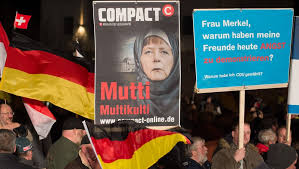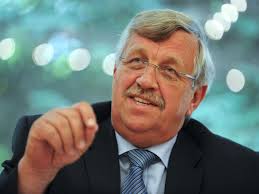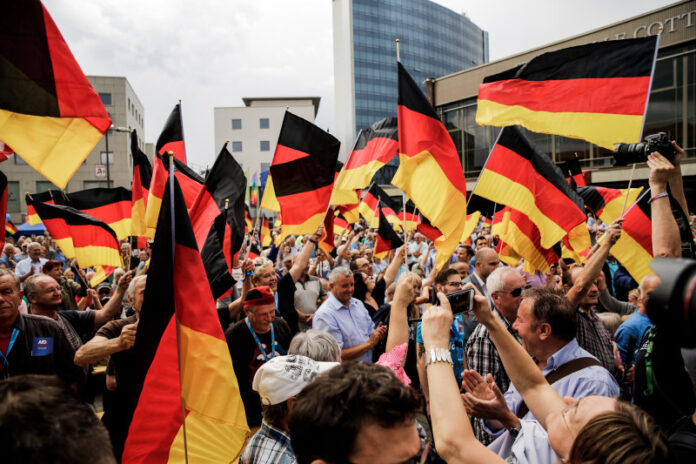After World War II, for more than 75 years, there was no important extreme right-wing party in Germany. Various small right-wing parties managed here and there to win seats in the parliaments of some individual German states, but only for one or two legislative periods. However, they never entered the national parliament. This situation changed in 2017. The AfD (Alternative for Germany) reached 12.6 % in the national elections. What had happened?
 People with a mainly neoliberal-conservative background, including many academics, founded the AfD in April 2013. They criticized the common European currency the “Euro”, some of them wanted to return to Germany’s former national currency, and above all, they called for more “national” sovereignty against the European Union (EU). The founding groups showed some similarities with the Brexiters in Great Britain. The party found support among some voters of the FDP (Free Democrats, a small but influential neoliberal party), and of the CDU (Christian Democratic Party, Germany’s big conservative party, which had become much less conservative since 2005, the year the party’s chairwoman, Angela Merkel, became German Chancellor). However, this support was not enough. At the national elections in September 2013, the AfD reached only 4.7%, but 5% is necessary in order to obtain seats in parliament.
People with a mainly neoliberal-conservative background, including many academics, founded the AfD in April 2013. They criticized the common European currency the “Euro”, some of them wanted to return to Germany’s former national currency, and above all, they called for more “national” sovereignty against the European Union (EU). The founding groups showed some similarities with the Brexiters in Great Britain. The party found support among some voters of the FDP (Free Democrats, a small but influential neoliberal party), and of the CDU (Christian Democratic Party, Germany’s big conservative party, which had become much less conservative since 2005, the year the party’s chairwoman, Angela Merkel, became German Chancellor). However, this support was not enough. At the national elections in September 2013, the AfD reached only 4.7%, but 5% is necessary in order to obtain seats in parliament.
 In 2015, Germany was confronted with the so-called “refugee crisis”. Many refugees from Afghanistan, Syria, and some African countries reached the EU and a large number of them tried to enter Germany. For a few months, chancellor Merkel opened the borders. This decision was not guided mainly by humanitarian considerations. Much more important was the fact that the number of refugees at the borders was so large that only military force could have prevented them from entering, but this would have caused a great domestic (and perhaps also an international) crisis. In 2015, almost one million refugees came to Germany. Many more than in the years before, but compared with the 82 million inhabitants and the enormous wealth of Germany, this was not a real problem. However, German nationalists and fascists saw a threat to the “German nation” by the so-called “refugee invasion”. While large parts of German society accepted refugees, right-wing groups attacked homes for refugees, and a smaller part of the German people, especially the inhabitants of smaller cities, protested against refugee homes in their neighborhoods.
In 2015, Germany was confronted with the so-called “refugee crisis”. Many refugees from Afghanistan, Syria, and some African countries reached the EU and a large number of them tried to enter Germany. For a few months, chancellor Merkel opened the borders. This decision was not guided mainly by humanitarian considerations. Much more important was the fact that the number of refugees at the borders was so large that only military force could have prevented them from entering, but this would have caused a great domestic (and perhaps also an international) crisis. In 2015, almost one million refugees came to Germany. Many more than in the years before, but compared with the 82 million inhabitants and the enormous wealth of Germany, this was not a real problem. However, German nationalists and fascists saw a threat to the “German nation” by the so-called “refugee invasion”. While large parts of German society accepted refugees, right-wing groups attacked homes for refugees, and a smaller part of the German people, especially the inhabitants of smaller cities, protested against refugee homes in their neighborhoods.
Under these conditions, the AfD was able to grow. From 2015 to 2017, the party managed to enter nearly all parliaments of the individual German states. During the national elections in September 2017, the party reached 12.6%. Although far fewer refugees reached Germany in 2018, the question of refugees and migrants remained an important political issue. Furthermore, the right-wing-violence against refugees and activists who supported refugees continued. In 2018 in opinion polls, the AfD had already reached 15-16%. Meanwhile, the party succeeded in merging the original conservative and neoliberal circles with nationalistic and fascist groups. In the past, small right wing parties had never been able to do this. However, the party did not get much support from big capitalist enterprises. There are some single right-wing business people supporting the AfD, but a large section of German capital is oriented to the world market. Exports play a crucial role for the German economy. Crude nationalist phrases do not help.
Nevertheless, the AfD’s success in elections strongly influenced the political discourse in Germany. Some sections of the CDU stressed that the number of refugees in Germany should be regarded as a problem and that the government should take seriously the “concerns” of the people about it. Some sections of the CDU even discussed whether cooperation with the AfD would be possible. Although the protests against the AfD continued – no AfD party convention took place without big counter-demonstrations – the party seemed to grow steadily and to become more and more influential.
In 2019, the situation began to change slightly. During the elections to the EU-parliament, the AfD reached 11%. A little bit less than during the national elections in 2017 and considerably less compared with the opinion polls of 2018. In early February 2020, the AfD seemed to have a parliamentary success in the East German state of Thuringia. Together with Thuringia’s FDP and CDU, the AfD voted in the parliament for a member of the FDP as prime minister of Thuringia. However, the protests among the German public and the resistance of the national leaders of especially the CDU were so great, that this prime minister had to resign after a few weeks. In the next state-level election, which happened in a western state of Germany, the FDP lost many voters – people punished the FDP for cooperating with the AfD, although this had happened in another German state.

In 2019 and in early 2020, extreme right wing assaults shattered Germany. In June 2019, right-wing extremists murdered the CDU local politician Walter Luebcke. In 2015, he had defended refugees against right-wing protesters. It was the first murder of a politician by right-wing terrorists since World War II. In October 2019, a right-wing terrorist tried to kill Jewish people in a synagogue. He failed, but he killed a pedestrian and attacked a Turkish fast-food restaurant, killing another person. In February 2020, another right-wing terrorist attacked two shisha bars, killing nine people. In all three cases, the murderers didn’t belong to any well-organized group. They had loose contacts to other extreme-right people, participating in right-wing demonstrations and events. They emerged from the background of a loosely connected right-wing scene, which extended from AfD to violent fascist groups.
As a result, not only leftists and activists of civil society but also the police and the domestic secret service became active against the extreme right. In the past, these institutions used to minimize the terrorist threat of the extreme right. Traditionally, they saw the enemy only on the left. Now, police and the domestic secret service had to admit that the main danger comes from the extreme right. The domestic secret service started to monitor the most extreme parts of the AfD. However, extreme-right tendencies also exist in the police and in the army. This summer, the minister of defense dissolved one of four units of the Special Forces, the elite troop of the German army, and the minister threatened to dissolve even more units if necessary. Right-wing networks also exist inside the police. In September 2020, a network of at least 30 police officers was discovered in Nordrhein-Westfalen, Germany’s largest state. However, the fight against such networks is not so easy, since most of Germany’s police are locally organized.
During the last few months, Covid-19 dominated public debate, and it is obvious that AfD has nothing to contribute regarding this issue. Now, AfD reaches around 10% in opinion polls. That’s still a lot, but much less than two years ago. For the national elections in September 2021, the AfD needs a program. Conflicts between the conservative-neoliberal wing (which wants for example to cut the welfare state) and the nationalist-fascist wing (which wants to extend the welfare state, but only for Germans) will increase. Probably, this conflict will further weaken the AfD. The fight against the AfD and extreme-right tendencies in Germany will continue. They will not disappear in the short run. However, there is a good chance of achieving considerable containment.
Michael Heinrich lives in Berlin, Germany. He is the author of “An Introduction to the Three Volumes of Marx’s Capital” and of a new Marx-biography, “Karl Marx and the birth of Modern Society”. Michael Heinrich has also travelled to India and conducted classes on Marx’s Capital.



























